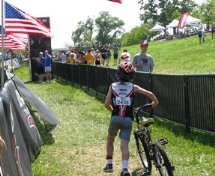Developing Your Junior Athlete Without Losing Them
Posted by matt russ on 10th Aug 2015
By Coach Matt Russ
 Great parents do not necessarily make great coaches for their children.
Coaching requires a certain level of objectivity, even detachment, that a
parent will generally not possess when it comes to their child. It is very
important to provide a level of training and teaching that is commensurate with
the junior athlete’s age, experience, and interest.
Great parents do not necessarily make great coaches for their children.
Coaching requires a certain level of objectivity, even detachment, that a
parent will generally not possess when it comes to their child. It is very
important to provide a level of training and teaching that is commensurate with
the junior athlete’s age, experience, and interest.
Children simply do not need highly structured coaching at an early age; they mainly need to have fun and to learn. For this reason, we will not design a structured training plan for a child under the age of 14, and even in the 14-16 age range we select athletes for our junior program on a case by case basis. We will offer coaching for skill sets, technique, safety, and mentoring under the age of 14, but defer structured programs to those offered by schools or team sports (such as the neighborhood swim team). It is vital to recognize that a child’s main motivation at a young age is to HAVE FUN. Although dad may be setting Ironman PRs, children simply do not have the internal drive, focus, or ambition that adults possess. Do not impose these ambitions on your child, or they may find that the pressure becomes too great and desire to participate is lost. Let your child explore different avenues in sport and come to their own decision as to what piques their interest.
Children should not be “training;” rather, they should be spending quality time with mom and dad. Avoid prescribing specific performance markers at a very early age (i.e. we must run 2 miles today) that may make this time drudgery. Keep the swim, bike, and runs unstructured and enjoyable. As they get older you can set reasonable goals and praise them for attaining them. Always keep feedback positive and the praise unconditional. When they do participate in an event, do not place too much emphasis on placement or prizes. There will be plenty of time for that as they get older.
In the pre-teen years, focus on building self-esteem, sportsmanship, and more challenging skill sets. If you do incorporate a coach, get to know him or her, their methods and philosophy, and make sure it is in sync with your own. Teach your child to show respect for the other competitors and their coach and do not coach from the sidelines. If you have an issue with a coach or program it is important to discuss this privately and not in front of other parents or your child. Children will mimic their parent’s behavior- both good and bad.
Matt Russ has coached and trained athletes up to the professional level, domestically and internationally, for over 15 years. He has achieved Elite coaching licenses from both USA Triathlon and USA Cycling, and is a licensed USA Track and Field Coach. Matt is Head Coach and owner of The Sport Factory, and works with athletes of all levels full time. He is a free lance author and his articles are regularly featured in a variety of magazines and websites. Visit www.thesportfactory.com for more information or email him at coachmatt@thesportfactory.com

